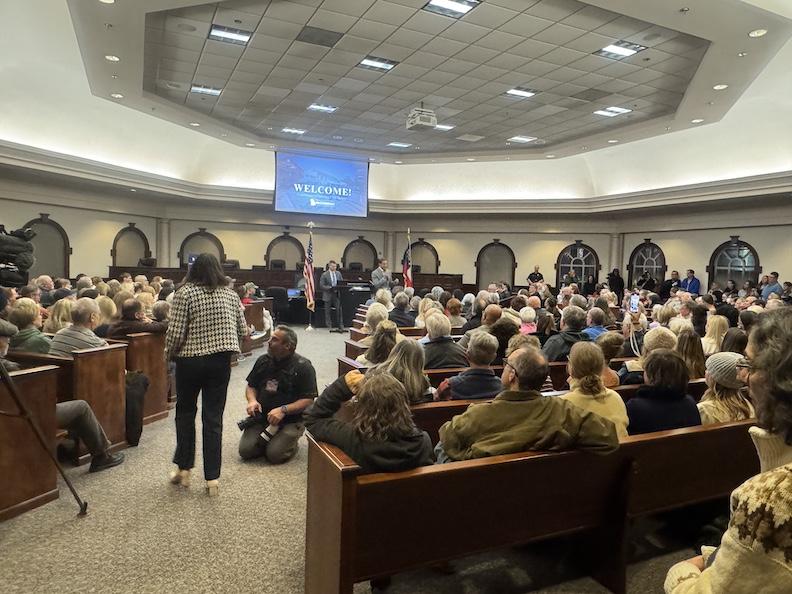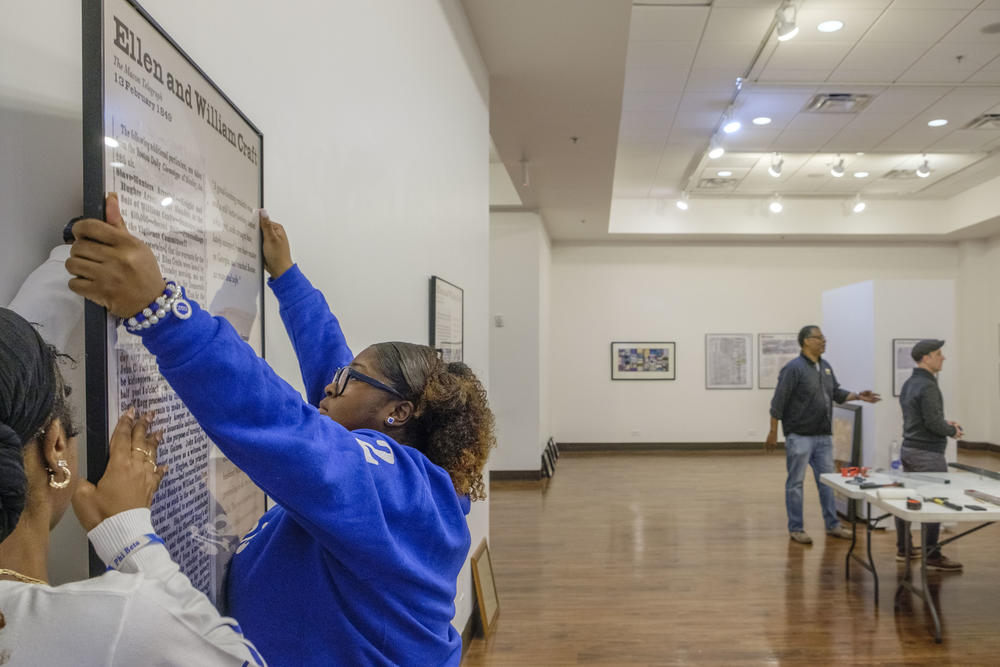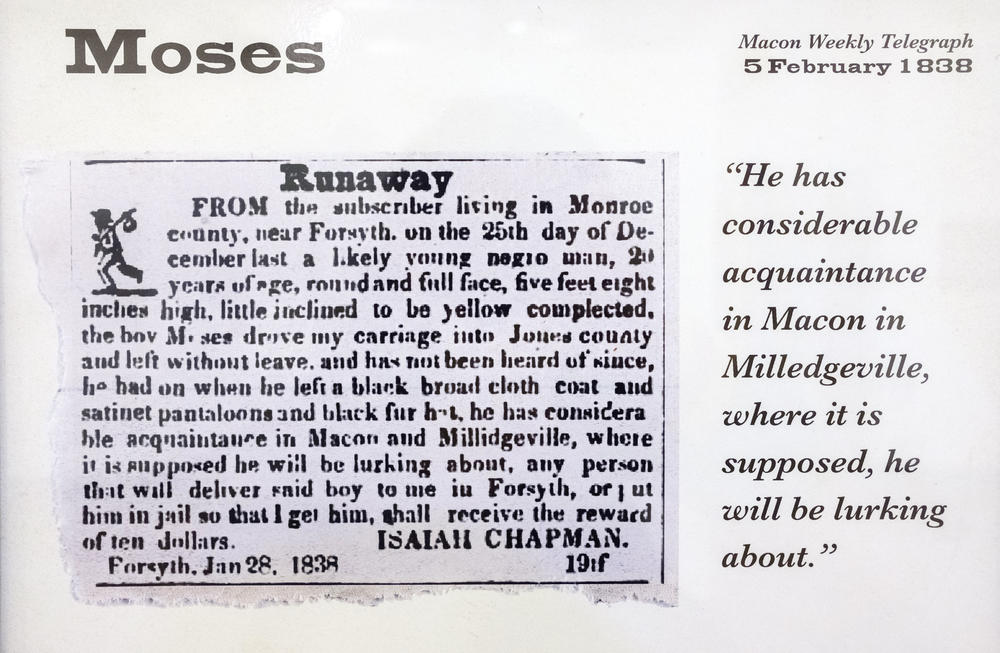
Section Branding
Header Content
Georgia Today: Abortion ban suit returns to court; Congressional town halls; Freedom Seekers exhibit
Primary Content
LISTEN: On the Friday, Feb. 21 edition of Georgia Today: A lawsuit challenging Georgia's near-ban on abortion is headed back to a trial court; Georgians express fear and outrage at congressional town halls; and a new exhibit at the Tubman African American Museum in Macon shines a new light on the lives of enslaved people.

Peter Biello: Welcome to the Georgia Today podcast from GPB news. Today is Friday, Feb. 21. I'm Peter Biello. This podcast has the latest reports from the GPB news team. Send feedback or story tips to GeorgiaToday@GPB.org. On today's episode: a lawsuit challenging Georgia's near-ban on abortion is headed back to a trial court. Georgians express fear and outrage at congressional town hall meetings, and a new exhibit at the Tubman African-American Museum in Macon shines a new light on the lives of enslaved people.
Taylor Boyd: Reading their stories and revealing that they were running away to families or had lovers really just exemplified the importance of why we need to showcase this.
Peter Biello: These stories and more are coming up on this edition of Georgia Today.

Story 1:
Peter Biello: The exact number of employees fired by the Atlanta-based centers for Disease Control and Prevention is still unclear. But a week after thousands of Georgians have lost their federal jobs, some Georgia Democrats are imploring Gov. Brian Kemp and state Republicans to voice their support and oppose the federal cuts. GPB's Sofi Gratas has more from the state Capitol.
Sofi Gratas: Among those laid off from the CDC in Atlanta is Sonya Arundar who worked in communications and web design.
I couldn't believe it. It was. It was just a shock.
She got the same termination letter as other federal employees without warning. Gov. Kemp has reiterated in a statement to GPB that he supports the, quote, "right-sizing" of the government. Lining the Capitol steps on Friday, some state Democrats and their constituents, including Joy Carter, said they'll keep raising the alarm about potential fallout of the layoffs.
Joy Carter: They may do this in Washington, but it has local effect, and I think the people that are in this building need to pay attention to that.
Sofi Gratas: Carter's daughter, who worked in vaccine safety, was also laid off last week from the CDC. For GPB News, I'm Sofi Gratas.
Story 2:
Peter Biello: A lawsuit challenging Georgia's near-ban on abortion is headed back to a trial court. The Georgia Supreme Court voted 6 to 1 yesterday to require the trial court judge to reexamine whether the people who want to overturn the law have legal standing to sue. In the meantime, Fulton County Superior Court Judge Robert McBurney's ruling from September striking down the abortion law remains on hold. McBurney had ruled in September that Georgia unconstitutionally prohibits abortions beyond about six weeks of pregnancy, often before women realize they're pregnant. McBurney reasoned that privacy rights under Georgia's state constitution include the right to make personal health care decisions. Georgia's law, signed by Republican Gov. Brian Kemp in 2019, was one of a wave of restrictive abortion measures that took effect in Republican-controlled states after the U.S. Supreme Court overturned Roe v. Wade in 2022. A dozen U.S. states are now enforcing bans on abortion at all stages of pregnancy, and four states ban abortions around the sixth week of pregnancy. Voters in Missouri overturned a near-total ban on abortions in November, and abortions resumed there last week.
Story 3:
Peter Biello: Lawsuit reform, Gov. Kemp's top priority this session finally made its way to the Senate floor today. GPB's Sarah Kallis reports.
Sarah Kallis: SB 68 would cap the amount of damages awarded in pain and suffering cases, limit liability for injuries that occur on an owner's property, and limit damages in medical malpractice suits to actual medical costs. Republicans like Senate President Pro Tempore John Kennedy generally supported the bill.
John Kennedy: It's going to deal with the issue of excessive lawsuits. And stabilizing the cost of insurance.
Sarah Kallis: Democrats like Sen. Nabila Islam Parkes mostly opposed it.
Nabila Islam Parkes: It's about creating a manufactured crisis to justify stripping away consumer protections and handling even more power to billion-dollar insurance corporations.
Sarah Kallis: The bill passed 33 to 21, with one Democrat and one Republican crossing party lines. For GPB News, I'm Sarah Kallis at the state Capitol.
Story 4:
Peter Biello: More than 500 constituents turned out in Roswell last night for a town hall hosted by Republican U.S. Rep. Rich McCormick, and many expressed outrage over President Donald Trump's recent statements and actions. At times, McCormick struggled to contain the crowd's outbursts, many of which disparaged Trump's recent statements likening himself to royalty. McCormick said he agreed with some of the constituents who said the presidency has grown too powerful.
Rich McCormick: I don't think executive privilege should be as strong as it is. I think we're out of bounds, right? I think your correct representation, — whether you like it or not — I'm the closest thing you have to representation.
Peter Biello: McCormick says, a potential remedy is a bill designed to give Congress the power to approve new federal regulations. His town hall comes as the executive branch's decisions to fire thousands of people are challenged in court.

Story 5:
Peter Biello: At the same time Rich McCormick faced constituents. Democrat Sanford Bishop, representing the [2nd] Congressional District in Southwest Georgia, took questions during a telephone town hall. One mother from Columbus asked Bishop if President Trump's actions against DEI policies could affect her son's senior year at a historically Black university, or HBCU.
Constituent: I'm concerned that the HBCU is DEI, isn't it? And will that be targeted more?
Sanford Bishop: Yes. With these executive orders rolling back DEI policies, HBCUs may face some significant funding cuts.
Peter Biello: Already, one U.S. Department of Agriculture scholarship program for HBCU students, the 1890 Program, has been suspended. Georgia's Fort Valley State University is a participating school.
Story 6:
Peter Biello: Lawyers for the state of Georgia argued in court yesterday executions of certain people on death row should resume because the conditions of a COVID-19 pandemic-related agreement have been met. The 2021 agreement stated that some executions would not be scheduled until the expiration of the COVID-19 emergency, the resumption of normal visitation at state prisons, and the availability of the COVID vaccine to "all members of the public." The vaccine is still not approved for infants under six months. The state argues vaccine antibodies can be transferred from a pregnant mother to a fetus, and therefore it is available to everyone. Fulton County Superior Court Judge Shakira Ingram said yesterday the two sides gave her a lot to think about and would issue a ruling.
Story 7:
Peter Biello: A bipartisan group of Georgia lawmakers is backing new efforts to protect the Okefenokee Swamp from mining. The two bills introduced yesterday would either ban future mining along the swamp's trail ridge or impose a five-year moratorium while experts assess environmental risks. The move comes as Twin Pines Minerals seeks final approval to mine for titanium near the refuge. Supporters say the pause would help protect one of North America's largest blackwater swamps. Twin Pines argues the project is safe and should move forward.
Story 8:
Peter Biello: Disability advocates say they are unhappy with Attorney General Chris Carr's decision to join a multi-state lawsuit that threatens 504 plans. 504 plans help ensure students with disabilities have equal access to educational opportunities. That includes kids with dyslexia or ADHD. Carr says he wants to eliminate provisions protecting children who are transgender.
Chris Carr: Make no mistake, our lawsuit is all about one thing: fighting the Biden-Harris administration's obsession with promoting a radical progressive transgender ideology at every turn. They tried to dismantle section 504 by labeling transgender dysphoria as a disability.
Peter Biello: The 17 Republican attorneys general that filed the lawsuit now say they never intended to get rid of all protections under 504. They've asked the court for a continued stay of the lawsuit, effectively putting it on pause with the expectation that President Donald Trump will roll back recent protections for transgender children.

Story 9:
Peter Biello: Through close to 35,000 documented sea voyages, more than 9 million people were taken from West Africa to bondage in the New World. That's according to the Transatlantic Slave Trade Database, a project of universities across North and South America. What can get lost in such massive numbers is the texture of the lives of the enslaved people themselves, their individual stories. Now, an exhibit called Freedom Seekers at Macon's Tubman African-American Museum sheds some light on those stories through old newspaper ads. GPB's Grant Blankenship explains.
Grant Blankenship: Tubman Museum curator Jeff Bruce and Mercer University professor of Africana Studies Matt Harper are still installing the exhibit a few days before it opens.
Jeff Bruce: Are you worried about crowding? We've got 18 ads on this wall.
Grant Blankenship: The ads lining the narrow gallery from the Macon Telegraph run between 1826 and the end of the Civil War. Each was paid for and placed in the paper by a slave owner seeking the return of an enslaved person who'd escaped, who ran away. The exhibit name: Freedom Seekers.
Jeff Bruce: We should put it in reading order.
Grant Blankenship: Each ad is reprinted and framed, and above each of the ads is the name of the person who was sought — typically just a first name. Ann. Sandy. Moses. Matt Harper points out the lone exception: Tom Hammons.
Matt Harper: He or the owner will only call him Tom, but he says he goes by Tom Hammons.
Grant Blankenship: Under circumstances he could control, the man seeking Tom Hammons:
Matt Harper: ...Is not going to give him his last name.
Grant Blankenship: But if you're really trying to find a person, it helps to tell other people exactly who you're looking for. And so when Tom Hammons, a boat hand on the Ocmulgee River, ran, he took control of his name. He forced the man he ran away from to acknowledge his name and share it with the larger world. In his campus office, Harper says it's the kind of detail he hoped his students would encounter when they began researching so-called "runaway slave" ads last year.
Matt Harper: I mean, as much as the enslavers wanted to get a return on their investment — they had lost property. And there they're writing about people as property.
Grant Blankenship: But they couldn't stop there.
Matt Harper: They can't help but, they actually want to get these people back, describe them as people, right? This is who they are. This is who their family members are. These are the things they like to do. This is what they're good at. This is how you'll know them. Their loves, their talents come through.
Grant Blankenship: Isaac is described as a good carpenter, fleeing on a sorrel mare in his blue satin knit round coat. Bill was a wagoner on the road between Augusta and Macon, who took with him a season's earnings. Jim is described as missing a finger and likely on the way to his mother. Judy and her daughter Unity escaped together: the mother's right arm said to be disfigured from being broken; the child described, by the man seeking them both, as quote "almost white."
Simone Walker: Are we too far off?
Taylor Boyd: As long as we go the same height. That's just to mark the height.
Grant Blankenship: Back in the gallery, Mercer University students Simon Walker and Taylor Boyd mount the panels for the most famous people to escape slavery in Macon: Ellen and William Craft. Boyd says the details in the ads imbue the people being sought with humanity.
Taylor Boyd: They had everyday problems, just like us. You know, sometimes it's easy just to simplify their story, but reading their stories and reading that they were running away to families or they had lovers, that really just exemplified the importance of why we need to showcase this.
Grant Blankenship: Newspapers everywhere ran runaway slave ads, especially after the passage of the federal Fugitive Slave Act of 1850, and as graphic design student Naluchi Okonkwo found, the ads had a consistent look.
Naluchi Okonkwo: It's essentially an icon.
Grant Blankenship: Or a set of icons.
Naluchi Okonkwo: I found a lot of them were repeating essentially the same exact graphic of the person walking with a stick.
Grant Blankenship: That's for men. Ads for women showed a bindle tied to the stick on their shoulder. The Fugitive Slave Act made it illegal for anyone to offer sanctuary to someone escaping slavery. It also gave everyone the opportunity to make money as a bounty hunter. It started with appeal for the newspaper ads. Naluchi Okonkwo says the icons helped hunters cut through the other visual clutter.
Naluchi Okonkwo: So that way, these, what do you call it? Slave catchers, if you will, for lack of a better term, know that, Oh, you're looking for a man this time. Oh, you're looking for a woman or. Oh, you're looking for a man and a woman or. Oh, you're looking for an older man or oh, you're looking for a more spritely man or any of those things.
Grant Blankenship: And when you think about it, these icons wouldn't have been an effective visual shorthand if people weren't seeing them all the time. The way we see Apples and swooshes and lowercase "F's" today.
Naluchi Okonkwo: That shows how prevalent slavery was.
Grant Blankenship: Professor Matt Harper:
Matt Harper: Students were really surprised by how frequent the ads were, that they were on every single issue, multiple ads per issue. Some were surprised about how long someone someone might be looking for someone — for two years, three years, keep running the ads over and over again in the paper.
Tamya Morrison: There were just so many and often they were all on one page.

Grant Blankenship: That definitely struck student Tamaya Morrison. Even now, months after the class, she still thinks about the ads a lot.
Tamaya Morrison: Oh, definitely. Because my family is from Macon. I think this class has really put a lot into perspective as far as my — not only my Macon heritage, but like my Southern Black heritage in general, because like, this is really how I got here. And it's like it makes so many things make sense.
Grant Blankenship: And among all the ads, there's one she finds particularly ironic.
Tamaya Morrison: I think the one that sticks out to me the most is the one about Moses, because his name is Moses. Of course.
Grant Blankenship: Even to slaveholding Christians, of which there were many Moses was known for leading his people from slavery. And so Morrison asked:
Tamaya Morrison: How can you hold a slave named Moses? But I mean, he still manages to escape and get — gain his freedom on Christmas Day.
Grant Blankenship: Yes, many of the ads depict suffering, she says.
Tamaya Morrison: But even through the suffering, you're able to see the resilience of the people. And I think that's something really special.
Grant Blankenship: As they attempted and often succeeded in leaving suffering behind. The Freedom Seekers exhibit at Macon's Tubman African-American Museum goes through March 22. For GPB News, I'm Grant Blankenship.
Story 10:
Peter Biello: Atlanta's Piedmont Park Conservancy is inviting the public to weigh in on draft plans for major park renovations. A virtual meeting scheduled for tomorrow would provide an opportunity for community members to share thoughts on one of two paths forward. One plan introduces new opportunities to play and gather, while the other emphasizes natural exploration and scenic views. Proposed improvements for both plans include dedicated bike and scooter paths, enhanced entrances, and increased biodiversity. Tomorrow's feedback session, held virtually, begins at 1:00.
Story 11:
Peter Biello: A music festival in Atlanta this weekend aims to raise support and awareness for the caregivers of those living with Alzheimer's. GPB's Ellen Eldridge explains.
Ellen Eldridge: The 11th annual Alzheimer's Music Fest, organized by advocates Vince Zangaro and Carissa Rumsey, will raise money for caregivers to buy the things they need — things like wheelchairs and hospital beds that aren't always covered by insurance. Zangaro says proceeds from the show will support the Cherokee County nonprofit Stand Up For Seniors.
Vince Zangaro: So working with Cherokee Senior Services and other senior services throughout the country is kind of the direction that Carissa and I are going through. Let's work straight with them. They have the infrastructure. Let's raise the money, create all these programs just like we have in the past. Respite care, free medical equipment, education support group.
Ellen Eldridge: Zangaro says the music festival takes place at Smith's Old Bar in Atlanta, and they plan to expand it to Savannah, Athens and other Georgia cities in the future. For GPB News, I'm Ellen Eldridge.
Story 12:
Peter Biello: The city of Atlanta has released what it's calling an employee bill of rights. Mayor Andre Dickens says the guide is meant to balance transparency and accountability. Its release comes in the wake of the abrupt resignation earlier this week of the city's inspector general, who said upon her resignation that recent changes to her office hindered her ability to investigate corruption. The city says the Office of Inspector General will remain independent. The bill of rights includes, among other things, any employee's right to quash subpoenas issued by the city's inspector general.
Story 13:
Peter Biello: A new book honoring the legacy of Congressman John Lewis is celebrating civil rights through quilting. The Atlanta Quilt Festival, in partnership with South Fulton Arts, has released Good Trouble Quilts: The Fight, the Progress, The Legacy, a 200-page photo book featuring quilt art inspired by Lewis's life. The book, available now, will be the centerpiece of this year's Atlanta Quilt Festival in August, with a book signing on opening day.

Story 14:
Peter Biello: In sports, in the NBA. Hawks All-Star guard Trae Young had some pointed comments about the officials following Atlanta's 114 to 108 loss to the Orlando Magic last night. Young, who was tagged with a technical foul early in the fourth quarter, said he felt the officiating was one-sided in the matchup of teams jockeying for playoff seeding in the Eastern Conference. The Hawks were whistled for 25 fouls and the Magic 22, but Orlando had 38 free throw attempts to Atlanta's 28. The Hawks were also called for three technical fouls, and the Magic 1.
And the Atlanta Braves kick off their spring training games tomorrow against the Minnesota Twins. And the season begins with new ways to watch the team. FanDuel Sports Network will be streaming games throughout Braves Country with no local blackouts. Fans can get monthly, seasonal or annual subscriptions. Games will also be available on Charter Spectrum, Comcast Xfinity, Cox, DirecTV, DirecTV stream, Fubo, Mediacom and U-verse TV.
And that's it for this edition of Georgia Today. Thanks so much for tuning in. I'm going to be taking some time off. I'm expected to become a dad next week, so I'll spend time with my new child. I will be back with you in April. You will be in good hands in the meantime. You can always check GPB.org/news for updates. I'm Peter Biello; thanks again for listening. We'll be back next week.
---
For more on these stories and more, go to GPB.org/news
Correction
In Story 5: Democratic U.S. Rep. Sanford Bishop represents the 2nd Congressional District in Southwest Georgia, not the 8th Congressional District, whose seat is held by U.S. Rep. Austin Scott.



